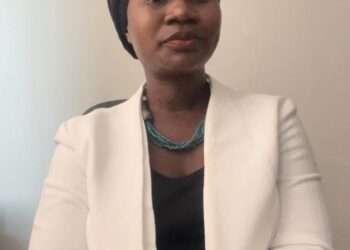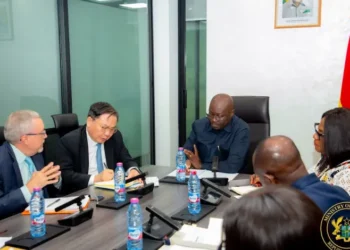Ghana’s financial landscape witnessed a positive turn as its dollar bonds experienced an upward trajectory. This surge followed an announcement that the nation anticipates reaching a debt-relief agreement with its official creditors in the coming week.
The primary objective behind this agreement is to qualify for further disbursement within the ambit of a $3 billion program established in collaboration with the International Monetary Fund (IMF).
Notably, Ghana’s Eurobond maturing in 2027 demonstrated resilience, marking its third consecutive day of growth by 0.71 cents, reaching 42.93 cents on the dollar. Simultaneously, bonds maturing in 2051 also posted gains, advancing by 0.74 cents to reach 42.13 cents on the dollar.
The optimism surrounding the potential debt-relief agreement was underscored by Ghana’s Minister of Finance, Ken Ofori-Atta, during his annual budget speech on the floor of Parliament. Ofori-Atta hinted at the likelihood of an agreement in principle on the restructuring parameters of Ghana’s bilateral obligations being reached within the next week.
The Minister expressed confidence, stating, “We expect the official creditor committee to come up with a memorandum of understanding which will ensure that this body co-chaired by France and China will deliver the appropriate MOU to the IMF.”
The significance of this agreement lies in its potential to unlock a second disbursement of $600 million from the IMF to Ghana. The initial disbursement of the same amount was granted when the IMF approved Ghana’s extended credit facility in May. This financial infusion plays a crucial role in supporting the nation’s economic stability and development initiatives.
Ghana’s overarching strategy involves a comprehensive restructuring of nearly all of its $50 billion debt to ensure long-term sustainability within the framework of the IMF program. However, a pivotal aspect of this restructuring is the need for an agreement with bilateral creditors, serving as the foundational basis for the subsequent revamping of approximately $13 billion of Eurobonds, involving both Ghana and private creditors.
The bilateral talks, If successful, positions Ghana favorably on the path to economic recovery. Minister Ofori-Atta emphasized the collaborative nature of this effort, highlighting the co-chairmanship of the official creditor committee by France and China.
Collaborative Approach
This collaborative approach not only reflects international support for Ghana’s economic endeavors but also signifies a multilateral commitment to fostering financial stability in the region.
The Impending memorandum of understanding (MOU) arising from these talks is expected to outline the restructuring parameters of Ghana’s bilateral obligations. This document will be instrumental in facilitating the disbursement process and aligning the nation’s economic policies with the conditions set forth by the IMF.
The positive market response, as evidenced by the rising value of Ghana’s dollar bonds, underscores investor confidence in the nation’s commitment to fiscal responsibility and sustainable economic practices. The market’s approval is not only contingent on the potential for a second disbursement from the IMF but also on the broader implications for Ghana’s debt restructuring efforts.
Ghana’s proactive approach to addressing its debt challenges sets a precedent for other nations grappling with similar fiscal issues. By engaging in constructive dialogue with both official and private creditors, Ghana is taking essential steps toward achieving a balanced and sustainable financial future.
The collaborative effort with France and China, in particular, signals a diplomatic and financial synergy that transcends individual interests for the greater economic well-being of the region.
As the week unfolds and the anticipated agreement with official creditors materializes, the international financial community will be closely monitoring Ghana’s progress. Successful negotiations and the subsequent disbursement from the IMF would not only provide immediate financial relief but also reinforce Ghana’s position as a responsible borrower committed to implementing sound economic policies.
Looking ahead, the agreement with bilateral creditors will serve as a linchpin for the broader debt restructuring plan involving Eurobonds. The $13 billion revamping process is a significant undertaking that necessitates a delicate balance between addressing the nation’s debt burden and maintaining investor confidence. Ghana’s ability to navigate these complexities will be crucial in determining the success of its economic recovery initiatives.
Ghana’s rising dollar bonds, fueled by optimism surrounding the imminent debt-relief agreement, paint a promising picture for the nation’s economic trajectory. The collaborative efforts with France and China, coupled with the support from the IMF, position Ghana on a path toward sustainable financial practices.
As the intricacies of debt restructuring unfold, the international community watches with anticipation, recognizing Ghana’s endeavors as a testament to the effectiveness of diplomatic and financial cooperation in addressing global economic challenges.





















